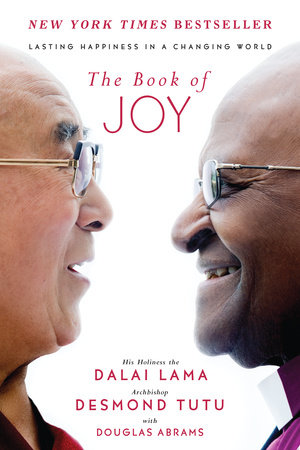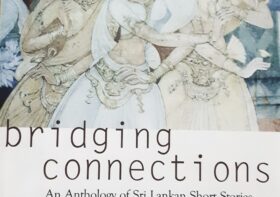The Book of Joy

వ్యాసకర్త: Naagini Kandala
*****************
The Book of Joy:Lasting Happiness in a Changing World by Dalai Lama XIV, Desmond Tutu, Douglas Carlton Abrams
కొన్ని పుస్తకాలు దాదాపు మర్చిపోయిన విషయాల్ని గుర్తు చేస్తాయి. అతి వేగంగా మారుతున్న ప్రపంచం రంగుల్లో మసకబారిపోయిన మానవీయ విలువల్ని మళ్ళీ మన దృష్టికి తీసుకొస్తాయి. ‘The Book of Joy’ అటువంటి పుస్తకమే. Narcissism లాంటి లేటెస్ట్ ట్రెండ్స్ ఇప్పటి జీవన విధానానికి సరికొత్త చిరునామాగా మారుతున్న ఈరోజుల్లో విలువలు, నీతులు అంటే అవేవో మరుగునపడిపోయిన విషయాలనీ, ఇప్పటి జీవన విధానానికి సరిపడవని కొట్టి పారేసే సమాజానికి ఈ పుస్తకం మరో పెద్ద బాలశిక్ష లాంటిది.
ఎవరమైనా ‘జీవితం నుండి ఏం ఆశిస్తాం?’ అనే ప్రశ్న వేసుకున్నప్పుడు వెంటనే వచ్చే సమాధానం ‘ఆనందంగా జీవించాలి’ అనే. కానీ ఆ ఆనందం కోసం మనిషి ఎంచుకునే మార్గాలతోనే చిక్కంతా! ఆధునిక జీవన విధానంలో చాలామందికి ‘ఆనందం’ ఎండమావి అయిపోతున్న సందర్భాల్లో, తాత్కాలికంగా దొరికే సంతోషం లా కాకుండా శాశ్వతానందం కావాలంటే ఆచరించవలసిన మార్గాలను దలై లామా, Desmond Tutu లు ఇందులో సూచించారు. దలైలామా జన్మదినానికి ప్రత్యేక అతిథిగా ఆ వేడుకల్లో పాల్గొనడానికి సౌత్ ఆఫ్రికా నుండి Archbishop Desmond Mpilo Tutu ధర్మశాల విచ్చేసిన సందర్భాన్ని పురస్కరించుకుని ఈ పుస్తకం రాయడానికి రచయిత, లిటరరీ ఏజెంట్ అయిన Douglas Carlton Abrams పూనుకున్నారు. ఇద్దరు నోబెల్ శాంతి బహుమతి గ్రహీతలు ఒకచోట చేరిన ఈ విలువైన సందర్భాన్ని ఊరికే వృధాపోనీయకుండా వారి మధ్య జరిగిన చర్చలకి పుస్తకరూపం ఇచ్చి, ప్రపంచ శాంతికి కానుకగా ఇచ్చామంటారు Douglas Abrams. ఈ పుస్తకం లో కొత్తగా చెప్పిన విషయాలు దాదాపు కనిపించవు. కానీ మనం నిత్యం మననం చేసుకోవలసిన విషయాలన్నీ మాత్రం ఒక చోట కూర్చి రాసినట్లు ఉంటాయి. ఈ పుస్తకాన్ని ఒక మూడు లేయెర్స్ కలిగిన బర్త్ డే కేక్ లా చూడచ్చు అంటారు Douglas Abrams.
*మొదటి లేయర్ లో ‘ఆనందం’ గురించి దలైలామా,Desmond Tutu లు బోధించిన అంశాలు ఉంటాయి.
*రెండో లేయర్ లో ఆనందం గురించిన లేటెస్ట్ సైన్స్ మరియు శాశ్వతానందం కోసం అవసరమయ్యే అని అంశాలు ఉంటాయి.
*మూడో లేయర్ లో ధర్మశాలలో లామా,Tutu ల సాహచర్యంలో గడిపిన సంఘటలూ,అనుభవాలూ ఉంటాయి.
వారంరోజుల పాటు ధర్మశాలలో Desmond Tutu ఉన్న సమయంలో దలైలామా-Tutu ల మధ్య సాగిన ఈ సంభాషణల్ని,
Day 1: Nature of True Joy
Day 2&3: The Obstacles of Joy
Day 4&5: The Eight Pillars of Joy లుగా విభజించారు,
వీటిల్లో Perspective, Humility, Humor, Acceptance, Forgiveness, Gratitude, Compassion and Generosity లను Eight Pillars of Joy గా చెప్తూ ఒక్కో అంశాన్నీ సహేతుకంగా విశ్లేషించారు.
ఈ పుస్తకాన్ని బుద్ధిజం లేదా క్రిస్టియానిటీకి ఏమాత్రం సంబంధం లేని రచనగా రూపకల్పన చెయ్యడానికి దలైలామా అన్ని జాగ్రత్తలూ తీసుకున్నారు. కేవలం వ్యక్తిగత అభిప్రాయాలూ, సంస్కృతి-సంప్రదాయాలే కాకుండా సైన్స్ ని కూడా ఈ పుస్తకం రూపకల్పనలో భాగంగా చేసి దీనిని సమస్తమానవాళికీ సంబంధించిన రచనగా రూపొందించారు. ఈ ఇద్దరు శాంతి ప్రబోధకుల జ్ఞానాన్ని కాచి వడపోసే పనిలో Douglas Abrams కు దలైలామా వద్ద ముప్ఫై ఏళ్లకు పైగా పని చేస్తున్న వ్యక్తిగత అనువాదకులూ/బుద్ధిస్టు స్కాలర్ అయిన Thupten Jinpa తుదివరకూ సాయమందించారు. అంతేకాకుండా గూగుల్ ఈ చర్చను హోస్ట్ చెయ్యడం మరో విశేషం.
ఇందులో ‘Joy’ గురించి చర్చించే క్రమంలో లామా, Tutu లు తమ వ్యక్తిత్వనిర్మాణానికి పునాదులు వేసిన అనేక అనుభవాలను మనతో పంచుకుంటారు. ముఖ్యంగా వెలివేత కారణంగా దలైలామా ప్రవాస జీవితానికి సంబంధించిన విశేషాలు, ఒక టిబెటన్ Monk గా ఆయన దైనందిన జీవన విధానానికి సంబంధించిన విశేషాలుంటాయి. ఆయన తన ప్రవాస జీవితాన్ని కూడా ఒక అమూల్యమైన అవకాశంగా ఎలా భావించారో ఈ విధంగా చెప్తారు.
Jinpa shared how the Dalai Lama often viewed his exile as an opportunity. “His Holiness often says that when you become a refugee you get closer to life,”
“One of my practises comes from an ancient Indian teacher,” the Dalai Lama began answering the Archbishop’s question. “He taught that when you experience some tragic situation, think about it. If there’s no way to overcome the tragedy, then there is no use worrying too much. So I practice that.”
There’s a Tibetan saying: ‘Wherever you have friends that’s your country, and wherever you receive love, that’s your home.’
The Dalai Lama was referring to the eighth-century Buddhist master Shantideva, who wrote, “If something can be done about the situation, what need is there for dejection? And if nothing can be done about it, what use is there for being dejected?”
ఈ క్రమంలో Desmond Tutu నెల్సన్ మండేలా గురించి పలుచోట్ల ప్రస్తావించారు. 27 ఏళ్ళ జైలు జీవితం మండేలా వ్యక్తిత్వంలో ఎలా పరివర్తన తీసుకొచ్చిందో వివరించారు. మరో సందర్భంలో John Allen రాసిన Desmond Tutu బయోగ్రఫీ Rabble-Rouser for Peace లో అవసరమైతే అన్యాయానికి వ్యతిరేకంగా గళం విప్పడంలో వెనకడుగు వెయ్యని శాంతికాముకుడైన Tutu నల్లజాతీయుల స్వాతంత్య్రం కోసం చేసిన పోరాటం ఒక పారడాక్స్ అంటారు.
“Discovering more joy does not, I’m sorry to say,” the Archbishop added, as we began our descent, “save us from the inevitability of hardship and heartbreak. In fact, we may cry more easily, but we will laugh more easily, too. Perhaps we are just more alive. Yet as we discover more joy, we can face suffering in a way that ennobles rather than embitters. We have hardship without becoming hard. We have heartbreak without being broken.”
పుస్తకం శాంతి, ఆనందం లాంటి పాజిటివ్ అంశాలను గురించి కాబట్టి కొన్ని చోట్ల చెప్పిన విషయమే మళ్ళీ మళ్ళీ చెప్తున్నట్లు అనిపించింది. మనం చెప్పిందే చెప్తావేమిటమ్మా అన్నా కూడా వెంటపడి పదే పదే అమ్మ చెప్పే మంచి మాటల్లా, ముందస్తు జాగ్రత్తల్లా ఉంటాయి. ఎటొచ్చీ పుస్తకం నిడివి తగ్గిస్తే మరికొంత బావుండేదనిపించింది. దలైలామా,Desmond Tutu ల ఆలోచనల్లో సారూప్యత కారణంగా ఇద్దరూ విభేదించిన విషయాలు ఒకటి రెండు తప్ప పెద్దగా ఏమీ లేవు. నెగటివ్ థాట్స్ విషయంలో మాత్రం దలైలామా ‘మెంటల్ ఇమ్యూనిటి’ ఉండాలంటే, Tutu మాత్రం acceptance ఉండాలంటారు. వారిరువురూ సూచించిన మార్గాలు వారివారి సంస్కృతీసంప్రదాయాలూ, మతవిశ్వాసాల మేళవింపుతో వేర్వేరుగా అనిపించినప్పటికీ చివరకు ఒక్కచోటే వచ్చి కలుస్తాయి. ఇద్దరి సంభాషణా ఆద్యంతం సరదాగా సాగిపోవడంతో పాటుగా, వారి చిన్న చిన్న మేనరిజమ్స్ గురించి రాయడం, ఇద్దరూ నవ్వుతూ మాట్లాడుకుంటున్న ఫోటోలు ఉండటం వల్ల ఇదొక ఇద్దరు మిత్రుల సంభాషణలాగే ఉంటుంది తప్ప, ప్రపంచ ప్రఖ్యాత స్పిరిట్యుయల్ లీడర్స్ చర్చలాగా ఎక్కడా అనిపించదు.
The two leaders had told us over the course of the week that there is no joy without sorrow, that in fact it is the pain, the suffering that allows us to experience and appreciate the joy. Indeed, the more we turn toward the suffering, our own and others, the more we can turn toward the joy. We accept them both, turning the volume of life up, or we turn our backs on life itself, becoming deaf to its music.
‘Joy’ గురించిన వివరణలు అయిపోయాక చివర్లో దలైలామా జన్మదిన వేడుకలు టిబెటన్ చిల్డ్రన్ విలేజ్ (TCV) లోని స్కూల్ పిల్లల సమక్షంలో జరిగిన విధానాన్ని గురించి రాశారు. కొందరు స్కూల్ విద్యార్థులు తమ దేశాన్నీ, తల్లిదండ్రుల్నీ వదిలి టిబెట్ నుండి దొంగచాటుగా చదువు కోసం ఇండియా వచ్చిన క్రమంలో తమ అనుభవాలను గురించి చెప్తూ దలైలామాకూ, ఆశ్రయం ఇచ్చిన భారత్ కూ కృతజ్ఞతలు తెలుపుతారు, ఆ తదుపరి Desmond Tutu సౌత్ ఆఫ్రికాకు తిరిగి పయనమవుతారు. ఆఖర్లో Joy practices గురించి రాస్తూ దైనందిన జీవితంలో ఆనందం కోసం చెయ్యవలసిన కొన్ని ప్రాక్టీసెస్ ని సూచించడంతో ఈ పుస్తకం ముగుస్తుంది. ధర్మశాల లోని McLeod Ganj, Norbulingka ఇన్స్టిట్యూట్ ల ప్రస్తావన ధర్మశాల వెళ్లిన రోజుల్ని గుర్తుకు తెచ్చాయి.
ఈ పుస్తకం రాయడంలో తన పాత్ర గురించి Douglas Abrams ప్రస్తావిస్తూ,
As the Archbishop had said, whether I was the best one or not, I was the one who was there.
Tutu నల్లజాతీయుల్ని సృష్టించడం గురించి సరదాగా ఈ విధంగా అంటారు,
God molded us out of clay and then put us into a kiln, like you do with bricks. God put one lot in and then got busy with other things and forgot about those he had put into the kiln. And after a while he remembered and rushed to the kiln, where the whole lot was burned to cinders. They say this is how we black people came about.
పిల్లల పెంపకం గురించి చెప్తూ,
As the Dalai Lama was speaking, I could not help thinking of how we try so hard, with our natural parental instinct, to save our children from pain and suffering, but when we do, we rob them of their ability to grow and learn from adversity. I recalled psychologist and Auschwitz survivor Edith Eva Eger saying that the spoiled, pampered children were the first to die at Auschwitz. They kept waiting for others to come save them, and when no one came, they gave up. They had not learned how to save themselves.
మరోచోట acceptance గురించి చెప్తూ,చెయ్యని నేరానికి ముప్ఫయి ఏళ్ళు జైలు శిక్ష అనుభవించి బయటకి వచ్చిన Hinton మాటల్ని ఈ విధంగా రాశారు.
When Hinton was interviewed on the American television show 60 Minutes, the interviewer asked whether he was angry at those who had put him in jail. He responded that he had forgiven all the people who had sent him to jail. The interviewer incredulously asked, “But they took thirty years of your life—how can you not be angry?” Hinton responded, “If I’m angry and unforgiving, they will have taken the rest of my life.
మృత సముద్రాన్ని ఉదహరిస్తూ చెప్పిన ఈ విశ్లేషణ బావుంది.
I’ve certainly found that to be the case so many times—you gave and it then seems like in fact you are making space for more to be given to you. “And there is a very physical example. The Dead Sea in the Middle East receives fresh water, but it has no outlet, so it doesn’t pass the water out. It receives beautiful water from the rivers, and the water goes dank. I mean, it just goes bad. And that’s why it is the Dead Sea. It receives and does not give. And we are made much that way, too. I mean, we receive and we must give. In the end generosity is the best way of becoming more, more, and more joyful.”
ఇప్పటి విద్యావిధానంలో మార్పులు చెయ్యాల్సిన అవసరాన్ని సూచిస్తూ..
“Now secular education is universal. So now we must include in formal education of our youth some teaching of compassion and basic ethics, not on the basis of religious belief but on the basis of scientific findings and our common sense and our universal experience.
ఒకచోట అసమానతల్ని మనుషులం ఎలా సహించామో ఈ Capuchin Monkeys ని ఉదాహరణగా తీసిన వీడియో గురించి చెప్పారు. వీడియో లింక్ ఇక్కడ.
పుస్తకం నుండి మరికొన్ని లైన్స్..
It was fascinating that the most asked question was not about how we could discover our own joy but how we could possibly live with joy in a world filled with so much suffering.
“All dharma teachings agree on one point—lessening one’s self-absorption.”
“Nice guys finish last” is a phrase that speaks to our deep ambivalence about kindness and compassion in the West. Success in our society is measured by money, power, fame, and influence.
I have told those who had lost their dear friend or family member, It is very sad, but this sadness should translate into more determination to fulfill their wishes. If the one you have lost could see you, and you are determined and full of hope, they would be happy. With the great sadness of the loss, one can live an even more meaningful life.
He knew that in the blinking and buzzing world of our lives, it is so easy to delete the past and move on to the next moment. To linger in the longing, the loss, the yearning is a way of feeling the rich and embroidered texture of life, the torn cloth of our world that is endlessly being ripped and rewoven.
Many years ago, I was at a gathering of medical scientists and researchers at Columbia University in New York. One of the medical scientists said in his presentation that those people who disproportionately use the first-person pronouns—I, I, I, me, me, me, and mine, mine, mine—have a significantly greater risk of having a heart attack.
Yet as a Buddhist practitioner, I thought of Shantideva’s somewhat stern advice: If there is a way to overcome the situation, then instead of feeling too much sadness, too much fear, or too much anger, make an effort to change the situation. If there’s nothing you can do to overcome the situation, then there is no need for fear or sadness or anger.
The suffering is what makes you appreciate the joy.
“With our mind we create our own world.”
Eger often quotes fellow Auschwitz survivor Viktor Frankl, who said that our perspective toward life is our final and ultimate freedom. She explains that our perspective literally has the power to keep us alive or to cause our death.
“One does not know the value of freedom until one has it taken away.
Impermanence, the Dalai Lama reminds us, is the nature of life. All things are slipping away, and there is a real danger of wasting our precious human life. Gratitude helps us catalog, celebrate, and rejoice in each day and each moment before they slip through the vanishing hourglass of experience.




Leave a Reply